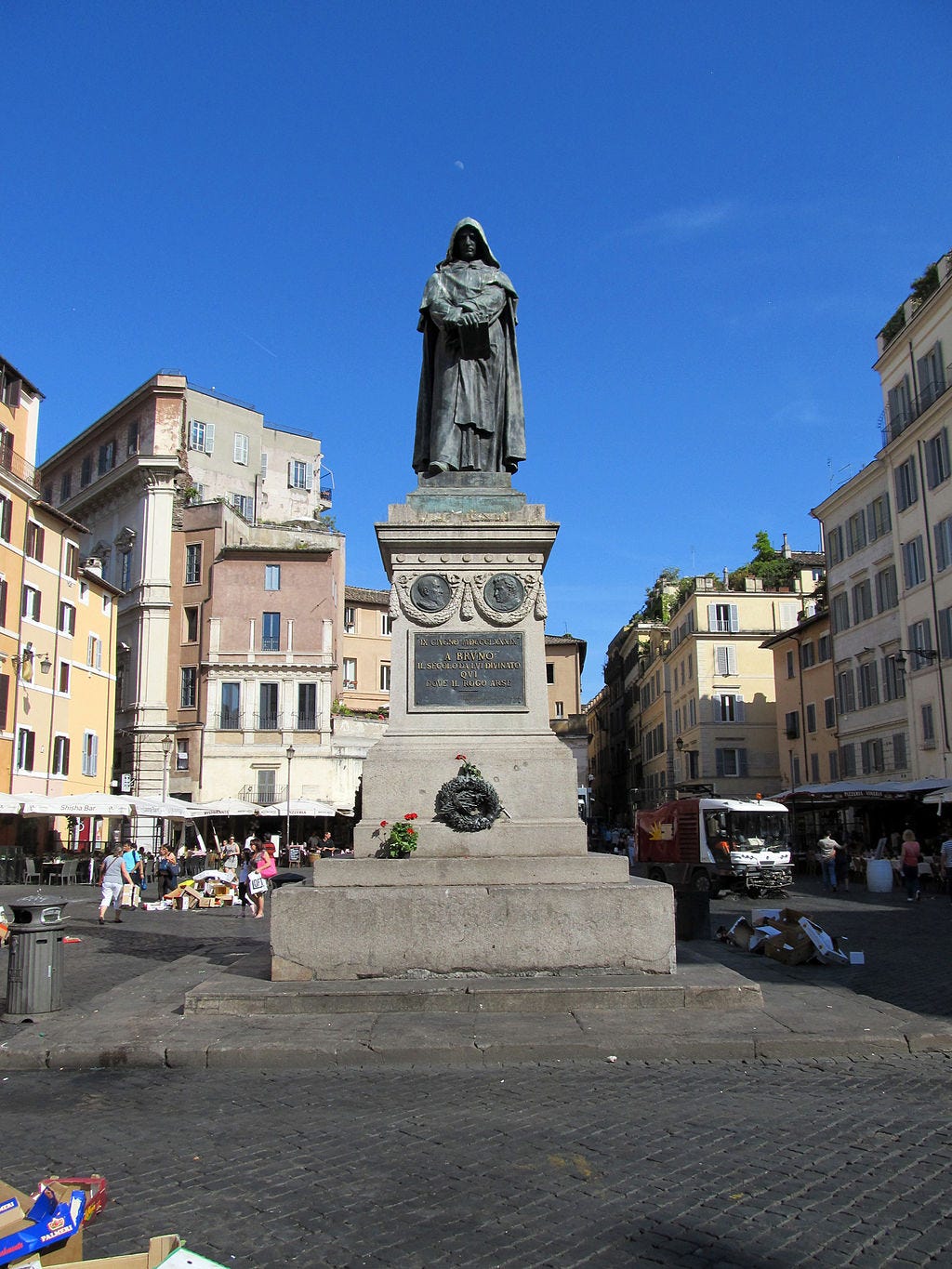The Martyrdom of Giordano Bruno: A Beacon of Free Speech
The Unsung Hero of Free Speech in the Renaissance
We need to talk about Bruno. Do you have unwavering faith and commitment to free speech? Of course you do if you're randomly reading this during your Saturday night. But some free speech activists shot their shot back in the 1500 and 1600s. You don't hear as much about them because the aristocrats of their era decided to do the old burning or hanging routine.
Anyway, let's get into who scared the powerful of his day so much simply by arguing for his ideas and others' rights to express their own. Giordano Bruno's journey unfolded during the Renaissance. The Renaissance was a period of significant revival across art, culture, and science. That was the bright side of the Renaissance... the darker side sometimes got a little "let's set them on fire" vibes.
Renaissance was also a time that could be harsh on those who dared to think differently. Born in 1548 and passing in 1600, Bruno was one of those bold spirits who navigated this era's complexities in a way that both cemented him in history and also likely led to his premature death. He fought for intellectual freedom against institutions that resisted such ideals at the time... so much that the Inquisition eventually investigated, charged, and ridded the world of Bruno.
A friar, philosopher, mathematician, poet, and cosmologist, Bruno was quite simply THE Renaissance Man. Forget Donald Glover or Elon Musk, Bruno was doing it all way back in the late 1500s. Throughout his life, Bruno passionately advocated for free speech.
Giordano Bruno was initially a Dominican friar, which is part of why I have always argued that Bruno's intentions were always noble. Specifically a friar takes rather important life vows of poverty, chastity, obedience, etc. He entered the Dominican Order at the age of 17. The year was 1565 and the location was the monastery of San Domenico Maggiore in Naples, Italy.
It wasn't a peaceful visit though (at least by the standards of a philosopher). Bruno's ideas often clashed with the orthodox Christian teachings of the time.
Picture Bruno, ensconced within the Dominican Order's walls, embarking on his intellectual odyssey. His early exposure to the thoughts of Aristotle and Copernicus soon ignited a fire of curiosity within him, leading him to question the accepted geocentric universe model. Championing the heliocentric theory, which posited the Sun at the universe's center, was not merely a debate on celestial mechanics for Bruno; it represented a bold claim on the right to question, to marvel, and to defy conventional wisdom. His audacious challenge to established doctrines spoke volumes of his unwavering belief in the sanctity of exploration and learning.
Bruno's intellect didn't stop at the stars. He envisioned and proposed an endless universe filled with myriad worlds. This flew in the face of the scientific dogma of his era, but more importantly for his fate, it was considered an outright affront to the Catholic Church. These weren't just speculative thoughts in the eyes of many and likely to Bruno himself. Whenever people wonder whether Bruno was gullible or misguided, I counter that I view him as neither of the sorts. If anything, I believe that Bruno was resigned to his eventual fate: the likelihood that he would be burned for his beliefs that dared challenge the standing dogma of his current world. With each act of defiance, Bruno gambled that the Church would continue to let him live, but more importantly he gambled that his words and his sacrifices would cause his followers--both it the era and to come--to investigate why he was burned alive for simply trying to bolster humanity's knowledge and help us find our sense of selves.
The true measure of Bruno's courage is best seen in his refusal to recant his views. He held firm despite facing intense persecution from society's wealthiest and most culturally ingrained institutions. His travels across Europe, in search of understanding and refuge, underscore his resolve. Even when some welcomed his ideas, his steadfast refusal to renounce his beliefs led to his arrest and years of imprisonment. Facing the prospect of death, Bruno's determination only grew stronger, becoming a symbol of resistance against the suppression of free thought.
Giordano Bruno, February 17, 1600
It was a cold day in February 17, 1600 when Giordanno Bruno was burned alive for his refusal to recant his beliefs. Rome's Campo de' Fiori marked the site in which Bruno was brutally destroyed--made an example of by the Church to discourage others who dare dream and question. And it worked. Many people who followed in Bruno's footsteps did not have nearly the same courage (or wit depending on your perspective). Instead, it cemented his status as a martyr for the cause of free thought, inspiring generations to cling to the ideals of intellectual liberty.
Reflecting on Bruno's story, it's hard not to make comparisons to modern issues, particularly since 2020. For example, I point to the threats of censorship, cultural pushes for both conformity and radical changes from individual people, and attempts by institutional power brokers to silence dissent voices. Bruno's life serves as a poignant and important historical lesson for all free speech advocates and philosophers of our age.
Giordano Bruno remains as a powerful reminder that some people will sacrifice everything they have--material possession and even their lives themselves--to protect free speech. Bruno challenges us to stand up for free thought, specifically we must actively USE our rights to intellectually explore, to question and scrutinize information sources, and to speak out when we think our voices add to the collective conversation. Bruno's legacy shines not merely as a beacon from the past but as a guiding light for the future during a time when free speech remains under cultural and political attack.
Different persecutors. Many current Brunos.






